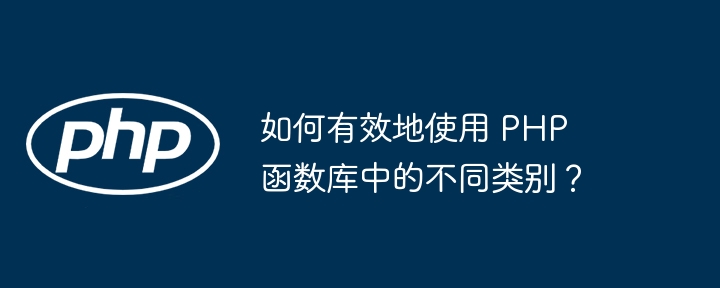
PHP Function Library contains the following categories: Core Categories: Basic Types, Math, Strings, Arrays Date and Time Categories: Date, Time, Time Zone File and Directory Categories: Files, Directories Network Categories: Sockets, URL, HTTP Security categories: encryption, hashing, random numbers Other categories: exceptions, debugging, images

How to take advantage of different categories in the PHP function library
The PHP function library is a large and powerful resource that contains a wide range of categories for performing a variety of tasks. Effective utilization of these categories is critical to writing efficient and maintainable PHP applications.
1. Core categories
Practical case: Calculate the average of the numbers in the array
$numbers = [1, 2, 3, 4, 5]; $avg = array_sum($numbers) / count($numbers); echo $avg; // 输出:3
2. Date and time categories
Practical case: Get the formatted current date
$date = date('Y-m-d');
echo $date; // 输出:2023-03-083. File and directory categories
Practical case: Reading data from a file
$contents = file_get_contents('data.txt');
echo $contents; // 输出:文件内容4. Network category
Practical case: Sending HTTP GET request
$url = 'https://example.com'; $response = file_get_contents($url); echo $response; // 输出:网页内容
5. Security category
Practical case: Encrypting sensitive data
$data = 'my secret data'; $encryptedData = openssl_encrypt($data, 'AES-128-ECB', 'my passphrase'); echo $encryptedData; // 输出:加密后的数据
6. Other categories
By understanding and effectively utilizing the different categories in the PHP library, developers can build applications that are powerful, efficient, and easy to maintain.
The above is the detailed content of How to effectively use the different categories in the PHP library?. For more information, please follow other related articles on the PHP Chinese website!